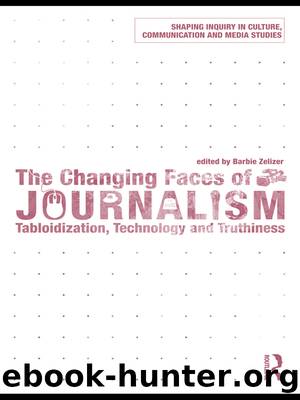The Changing Faces of Journalism by Zelizer Barbie;

Author:Zelizer, Barbie;
Language: eng
Format: epub
Publisher: Taylor & Francis Group
Published: 2011-01-02T00:00:00+00:00
Chapter 8
Technology and the Individual Journalist: Agency Beyond Imitation and Change
Mark Deuze
Journalism as a profession is important to democratic society not just because of what it produces but also how news is produced: under what conditions, for what purposes, within which institutional mindset and professional identity. Consequently, the field of journalism studies has many canonic texts investigating and documenting who journalists are, how they do what they do, and how news cultures and occupational ideology give meaning and provide structure to their work.1 Yet considering the significant transformations in the creation of content in the journalistic field that have emerged during the past couple of decades, which have been supercharged by rapidly changing disruptive technologies, it is crucial to reconsider sedimented ways of understanding and the work that journalists do under contemporary conditions.2
The fundamental perspectives with which scholars study and interpret the work of journalists are generally framed in terms of the economic, social, and cultural organization of newswork.3 In this contribution I will focus on such economic, social and cultural explanations as a structure for my argument. This structure is set against the contemporary rapidly changing realities of newswork and employment in the field of journalism. The perspective used to make sense of these changes is that of the individual newsworker. In order to do so, journalism is first conceptualized as the ensemble of attitudes and behaviors of individuals (rather than as a set of institutions, social system, professional group or news industry). Theories of newswork are then reconsidered in terms of recent changes and challenges in the ways in which journalism as a field of work is managed and organized in society.
Running through these considerations is a specific focus on the amplification effect of technology. Considering the role of technology as an amplifier and accelerator of change in journalism means focusing on how journalists appropriate technologies in the service of established goals, strategies, and relationships in ways that accelerate current constituent trends, developments and activities of journalism. Technology in this sense is neither a necessary change agent nor a vehicle for seamless reproduction. It is seen as a âsuperchargerâ of emerging trends and developments affecting the work of journalists.
The emphasis here refers to the explanatory potential of re-theorizing dominant perspectives in the social sciences on newswork so as to understand the individual news producer. The essay concludes with a brief discussion of the opportunities for reinvigorating journalism studies and education with a specific focus on the evolving âworkstylesâ of journalists: their ways of working and being at work.4 In making this argument, I regrettably sidestep a number of definitional issues (what is journalism and who is a journalist), and cross-cultural complexities (specifying differences in markets and news cultures in various countries and regions). However, as this paper intends to make a point rather than prove one, I hope to argue that the study of journalism needs to engage with the changing nature of employment and the creative process.
Download
This site does not store any files on its server. We only index and link to content provided by other sites. Please contact the content providers to delete copyright contents if any and email us, we'll remove relevant links or contents immediately.
Asking the Right Questions: A Guide to Critical Thinking by M. Neil Browne & Stuart M. Keeley(5357)
Autoboyography by Christina Lauren(5086)
Dialogue by Robert McKee(4160)
Eat That Frog! by Brian Tracy(4149)
Sticky Fingers by Joe Hagan(3912)
Journeys Out of the Body by Robert Monroe(3460)
Annapurna by Maurice Herzog(3299)
Full Circle by Michael Palin(3268)
Elements of Style 2017 by Richard De A'Morelli(3237)
Schaum's Quick Guide to Writing Great Short Stories by Margaret Lucke(3187)
The Art of Dramatic Writing: Its Basis in the Creative Interpretation of Human Motives by Egri Lajos(2857)
The Diviners by Libba Bray(2800)
Why I Write by George Orwell(2775)
The Mental Game of Writing: How to Overcome Obstacles, Stay Creative and Productive, and Free Your Mind for Success by James Scott Bell(2766)
In Patagonia by Bruce Chatwin(2755)
Atlas Obscura by Joshua Foer(2705)
The Fight by Norman Mailer(2701)
Venice by Jan Morris(2430)
The Elements of Style by William Strunk and E. B. White(2377)
